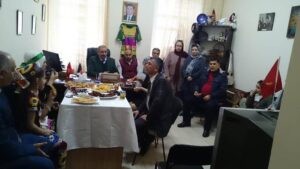KABUL (SW) – The new decree by the Islamic Emirate leader regarding access to information has caused concerns among journalists.
A number of journalists in Kabul say that the new order of Hebatullah Akhundzada, the leader of the Islamic Emirate, that only the spokesmen of each department or ministry are required to talk and share information with the media, limits the access of journalists to information more than before.
The leadership of the Islamic Emirate issued a new order on Monday, and ordered the officials of the departments and ministries that “only the spokespersons of each department or ministry have the obligation and the right to talk to the media”. In this decree, speakers are asked to obtain permission from the leadership of the relevant ministry or department before sharing information with the media.
In part of the new order of the leader of the Islamic Emirate, it is stated: “Except for the spokespersons, no one can share information or make a statement on behalf of the Islamic Emirate of Afghanistan. Spokespersons of the Islamic Emirate should refrain from commenting on political issues in which the position of the Islamic Emirate of Afghanistan is not clear.”
Now, the issuance of this decree has cause concerns among journalists. They say that the implementation of this decree will limit journalists’ access to information more than before and make their work more difficult.
“The new decree of the leader of the Islamic Emirate increases the restrictions on the media. We need fresh and accurate information every day. If we want this accurate and fresh information and if it the situation is like this every day, it will make us face problems,” Ali Akbar Ahmadi, based in Kabul, told Salam Watandar.
Another Kabul resident Islamuddin Behnoosh, also said: “Requiring spokespeople to obtain permission from the leadership of ministries to publish and share information with the media increases the problem of accessing information. We ask the leadership members of the Ministry of Information and Culture to provide more facilities for journalists to access information.”
On the other hand, some other journalists in Kabul want more cooperation between spokespersons and the media.
Ziyarmal Hotaki, another journalist in Kabul, said: “We are facing problems with some spokesmen in accessing information. Some spokespersons don’t cooperate well with the media to access information. The authorities should cooperate more with the media.”
However, Khobaib Ghofran, the spokesperson of the de-facto Ministry of Information and Culture, says that the new decree of the leader of the Islamic Emirate does not limit the access of journalists to information, but makes the spokespersons of this government aware of their duty.
“The new order of the leader of the Islamic Emirate doesn’t mean restrictions on access to information. This is one of the basic duties of all spokespersons and departments, and this is the principle and standard all over the world that the spokesperson of every department needs to consult with the leadership of the department about sensitive issues, and this order is to harmonize access to information,” he added.
It should be noted that in the past three years, more than 17 decrees have been established by the Islamic Emirate for the media and journalists, including the wearing of masks by female journalists on television.






